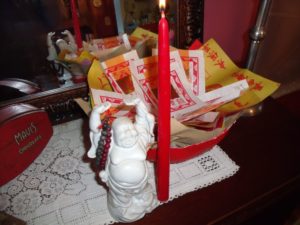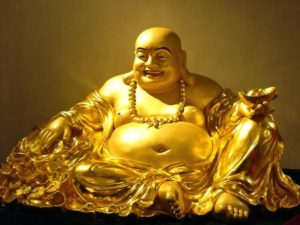 Anybody who knows me knows that I love Chinese food. Everything from traditional dishes from different regions of China to classic Americanized Chinese food, I eat it all. I’ve spent many fun nights with friends and family getting takeout and having long leisurely dinners in kitschy 1950’s style Tiki-Polynesian-Chinese themed restaurants. One decoration that is ubiquitous in such establishments is the fat, smiling laughing Buddha known popularly as the Lucky Buddha. Sometimes he is presented as simply a fun decoration and restaurant patrons are encouraged to rub his round belly for luck and other times I have had the privilege of seeing him on kitchen altars out of sight of customers next to images of other Taoist gods and ancestor portraits where restaurant owners and workers appeal to him to request good luck and financial blessings. Most likely introduced to American society by Chinese immigrants in 1800’s and early 1900’s, the Lucky Buddha has moved beyond Chinese owned businesses into spiritualist and Hoodoo circles and into American homes in general as a symbol of good luck and fortune. Often times he is kept simply as an ornament and not taken seriously, but for those who are spiritually included, the Lucky Buddha can help summon tremendous wealth and good fortune.
Anybody who knows me knows that I love Chinese food. Everything from traditional dishes from different regions of China to classic Americanized Chinese food, I eat it all. I’ve spent many fun nights with friends and family getting takeout and having long leisurely dinners in kitschy 1950’s style Tiki-Polynesian-Chinese themed restaurants. One decoration that is ubiquitous in such establishments is the fat, smiling laughing Buddha known popularly as the Lucky Buddha. Sometimes he is presented as simply a fun decoration and restaurant patrons are encouraged to rub his round belly for luck and other times I have had the privilege of seeing him on kitchen altars out of sight of customers next to images of other Taoist gods and ancestor portraits where restaurant owners and workers appeal to him to request good luck and financial blessings. Most likely introduced to American society by Chinese immigrants in 1800’s and early 1900’s, the Lucky Buddha has moved beyond Chinese owned businesses into spiritualist and Hoodoo circles and into American homes in general as a symbol of good luck and fortune. Often times he is kept simply as an ornament and not taken seriously, but for those who are spiritually included, the Lucky Buddha can help summon tremendous wealth and good fortune.
 It may come as a surprise to many that the Lucky Buddha is not in fact Gautama Buddha, the founder of Buddhism. I only recently learned this myself. He is in fact called Budai and was a traveling monk in China born in the city of Zhejiang during the Liang Dynasty. Budai would travel from place to place and was known to carry a large sack of gifts that he would deliver to locals and he had a reputation for laughing and smiling. Hence his association with wealth, abundance and joy and his depiction in popular imagery as a round laughing man carrying a huge sack overflowing with gifts and surround by coins and other symbols of good luck and prosperity. Budai is believed by followers of Chinese Buddhism to be the incarnation of Maitreya, the future Buddha. This belief came about due to Budai’s last words:
It may come as a surprise to many that the Lucky Buddha is not in fact Gautama Buddha, the founder of Buddhism. I only recently learned this myself. He is in fact called Budai and was a traveling monk in China born in the city of Zhejiang during the Liang Dynasty. Budai would travel from place to place and was known to carry a large sack of gifts that he would deliver to locals and he had a reputation for laughing and smiling. Hence his association with wealth, abundance and joy and his depiction in popular imagery as a round laughing man carrying a huge sack overflowing with gifts and surround by coins and other symbols of good luck and prosperity. Budai is believed by followers of Chinese Buddhism to be the incarnation of Maitreya, the future Buddha. This belief came about due to Budai’s last words:
彌勒真彌勒,化身千百億,時時示世人,時人自不識
Maitreya, the true Maitreya
has billions of incarnations.
Often he is shown to people at the time;
other times they do not recognize him.
The idea that Budai is in fact Gautama Buddha, the founder of Buddhism, no doubt came about as a result of lack of knowledge and confusion regarding the similarity of the words “Buddha” and “Budai” on the part of Westerners after being introduced to the West by Chinese immigrants to America and Europe. Over time Budai became commonly known as The Lucky Buddha. Budai is also known in Japan where he is called Hotei and is counted as one of the Seven Lucky Gods. Today many people in China and elsewhere in the world keep images of the Lucky Buddha and believe in his ability to drawn wealth and luck even if they do not follow Chinese Buddhism or Taoism that closely.
Starting the early 1900’s, the Lucky Buddha began to appear in Hoodoo circles in the American South. This does not surprise me since Hoodoo practitioners live by the philosophy that if it works, we use it. So it’s not hard to believe that the Lucky Buddha was quickly assimilated into Hoodoo practice after it was seen to be effective in Chinese businesses. Another important Hoodoo product that was influenced by Chinese immigrants is the Chinese floor wash about which I have written previously on this blog. Lucky Buddhas quickly became an important addition to money altar among practitioners. Lucky Buddha candles can be found at pretty much any botanica or spiritual shop that caters to the needs of practitioners of African diaspora religions. Such candles are highly effective in drawing luck and money to a business or to one’s life in general, and I highly recommend them. I personally have a Lucky Buddha statue on my money altar and I do light Lucky Buddha candles as well. At the very least, I would recommend keeping a small Lucky Buddha image in your home or place of business as its mere presence summons money and luck.
I have an interesting Lucky Buddha story that happened in the early 90’s to an acquaintance of mine from Boston named Lois. Lois was in the mall one day and she saw small Lucky Buddha figurines. One in particular that was make out of an opaque green glow in the dark material caught her eye. She bought the Buddha and after only taking a few steps, she found a $5 bill on the ground and picked it up. On her way home, she stopped at a convenience store and bought a scratch off lottery ticket and scratched it off in her car. She screamed in delight when she realized she had won $7000 dollars! She used that money to open a manicure business which did phenomenally well and expanded into other forms of cosmetology. Lois always kept the Lucky Buddha on view in her shop and told her story of lottery luck after buying the statue to anyone who would listen. I’ve heard through the grapevine that Lois, now close to 70 years old, has finally retired with a tremendous amount of money. I’m sure the Lucky Buddha played a role in her ongoing success!
I hope you have enjoyed this post and I thank you for taking the time to visit my blog. As always, I wish you peace, happiness and abundant blessings!